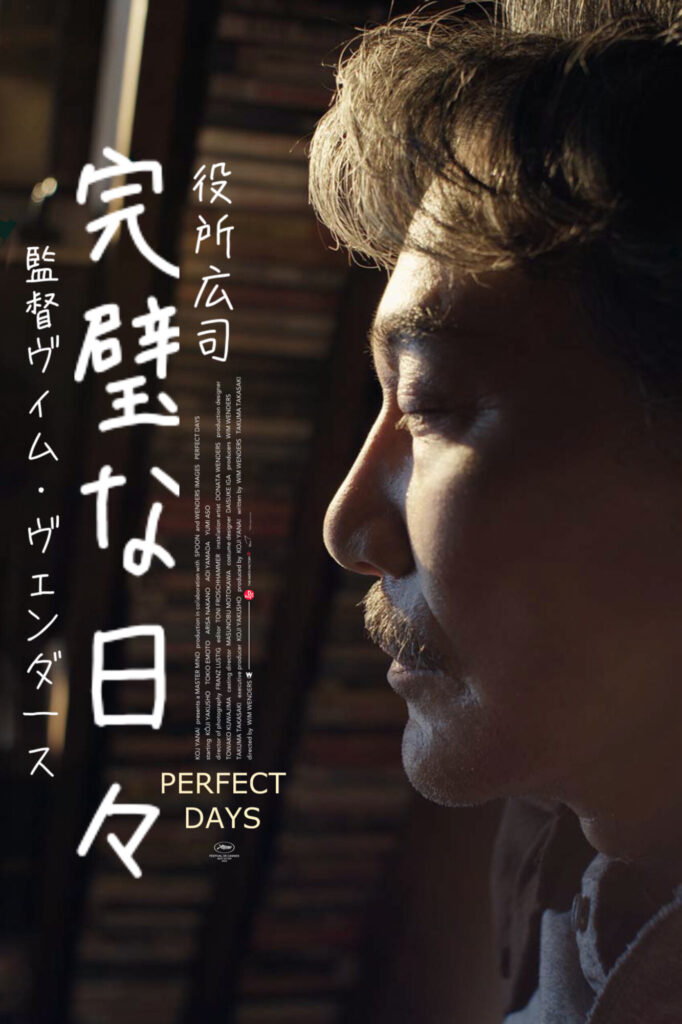
It all started with German director Wim Wenders being invited to Japan to look at Toilets. Specifically, the seventeen toilets created through the Tokyo Toilet Project. In 2018, Sixteen creators from around the globe came to Japan to redesign public restrooms in Shibuya. In turn, the German filmmaker was tasked with making a short film, or even a series of short films involving the project.
This idea is the seed that eventually blossomed into the feature-length film Perfect Days (2023), a Cannes Film Festival Award for Best Actor, and even an Oscar nomination. All of these accolades and this massive global collaboration were in service of just a few public restrooms. Perfect Days itself is a celebration of the mundane; taking a slow and methodical look at the day-to-day life of Toilet cleaner Hirayama.
At first, I was apprehensive about viewing this film. Not out of any negative assumptions regarding the premise, but rather out of concern about the language barrier. This blog started as a celebration of appreciating Japanese cinema without the guide of subtitles. However, I feared this film might prove to be an insurmountable challenge. After all, unlike previous reviews, Perfect Days is a straight adult drama with no source material or direct inspiration.
Thankfully, within the first 20 minutes, it became apparent this was a comically misguided worry. Not only was there no impenetrably difficult Japanese; the film contained barely any dialogue. Our main character is a kindly old man, but a bit of a recluse.
Much of the runtime is spent quietly observing his routine as he cleans toilets, shops for books, goes to the bathhouse, and goes to dinner alone. Other characters will try to engage Hirayama in conversation but he rarely does more than return a smile.
Perfect Days is far from the first project to portray the monotony of everyday life through purposefully slow and repetitive filmmaking. There is Sights & Sound’s “Greatest Film of All Time” Jean Dielman 23 Commerce Quay, 1080 Brussels (1975), or even this year’s The Zone of Interest (2023). However, Perfects Days’s filmmaking has vastly different motivations than those films (to put it mildly).
Perfect Days tries to show the calm and even therapeutic nature of routine. Throughout the film, repeating scenes and moments give us a thorough understanding of a day in Hirayama’s life. Like his daily habits, the camera and editing often mirror themselves. Each day begins with near identical shots of Hirayama walking out into the sun and ends with a variation of the same black-and-white dream sequence. We come to peace with it the same as the character.
This is why it hits us like a ton of bricks when even inconsequential changes in the routine start to pop up. For example, every day Hirayama goes to the same restaurant, sits at the same seat, and is greeted the same way by the owner. Until one evening this same restaurant is packed. Hirayama has to find a new seat, and the owner barely has time to greet him before moving on to other customers.
On its surface, a scene like this would not have much of an emotional effect. However, because we have spent so much time engrossed in this routine, we intensely feel the surprising weight of all these slight inconveniences.
Like this, each aspect of Hirayama’s life slowly forms into small vignettes, with subtle arcs and conclusions. It’s obvious this project was conceived as multiple short films. The sections don’t always tie into each other, but they all support the picture as a whole. Maybe we’re seeing a short film about a weeklong tic-tac-toe game between Hirayama and an anonymous bathroom goer, maybe we’re following the love-life Hirayama`s irresponsible assistant, or maybe just the “story” of Hirayama going to the bar every time he has the day off. All of these are given the same precedence for the audience, so we connect with them all.
All of this would not be possible without Koji Yakusho’s subdued performance. At this point, Yakusho has earned praise front and back for his turn here, and I will not be the exception. Hirayama was not an easy role; relying mostly on facial expressions while not being allowed to go BIG with any of them.
Most character studies at least focus on a very eccentric or flamboyant personality, but Perfect Days is about a man who has both appear complex while remaining wholly average. That is essentially the driving force of the film, not only in its main character but also in its conception, its creation, and the filmmaking itself.